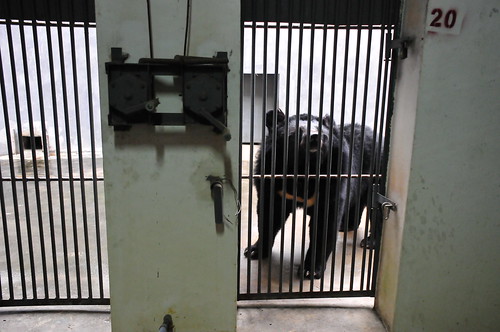Farm to sanctuary: improving lives from day one
02 May 2014
As Animals Asia takes over the care of the bears at the bear bile farm in Nanning, China, the organisation is faced with the huge challenge of turning a place of torture into a place of sanctuary. The process will be a long one, but change can begin immediately.
Once the sickest 28 bears have been transferred to our Chengdu sanctuary, the farm will hold 100 bears. Bile extraction may have stopped in 2011 but the legacy of its invasive methods, and the low quality care the bears received remains.
Animals Asia will immediately set about correcting the bears’ diets. Rice gruel and corn buns will be changed for a variety of fruit and vegetables supplemented with dog biscuits for protein.
A major challenge will be improving the mental health of the bears. Presently, many are exhibiting signs of mental distress. Stereotypical behaviour, the repetition of unnatural actions such as pacing and head swaying, is the clearest sign of this and is being observed in many of the sanctuary’s residents.
Recovery can be achieved by introducing physically and mentally stimulating enrichment items and practices to every aspect of the bears’ lives. Enrichment items can include puzzle feeders, climbing structures, strong smelling smears and any other item that allow the bears to exhibit natural behaviours.
Nic Field, China Bear and Vet Team Director said:
“From the first day we enter, we’ll be able to instigate top to bottom changes from the basics of free access to drinking water to biosecurity procedures such as sterilising foot baths for visitors that will stop disease spreading throughout the bear population. Then there all the vital but less glamorous tasks that go on in the background like introducing safety procedures in day to day care and developing bear records that staff use to record health and behaviour as part of monitoring.”
Animals Asia founder and CEO, Jill Robinson MBE said:
“While physically building the improved structures that the facility needs in the long-run will take up to two years – so much can be done immediately to improve the mental and physical health of the animals. Right from day one, we can begin to transform the nightmare of a bear bile farm into a sanctuary and improve these poor animals’ lives.”
Please help us turn a bear bile farm into a sanctuary.
BACK





 Healing the hidden wounds
Healing the hidden wounds
 Early summer awakening at the China Bear Rescue Centre!
Early summer awakening at the China Bear Rescue Centre!
 New year, new home for Christmas the Bear!
New year, new home for Christmas the Bear!